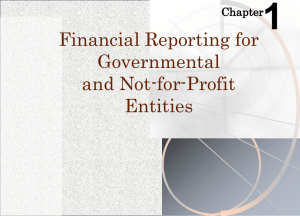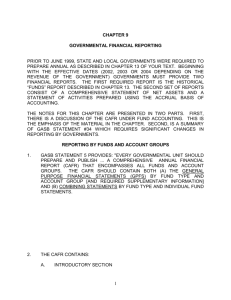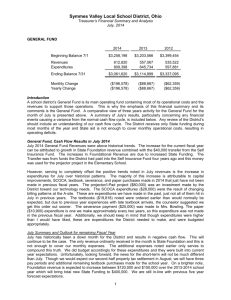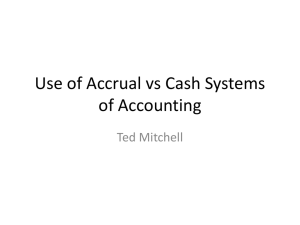Basis of Accounting, Measurement Focus, and
advertisement
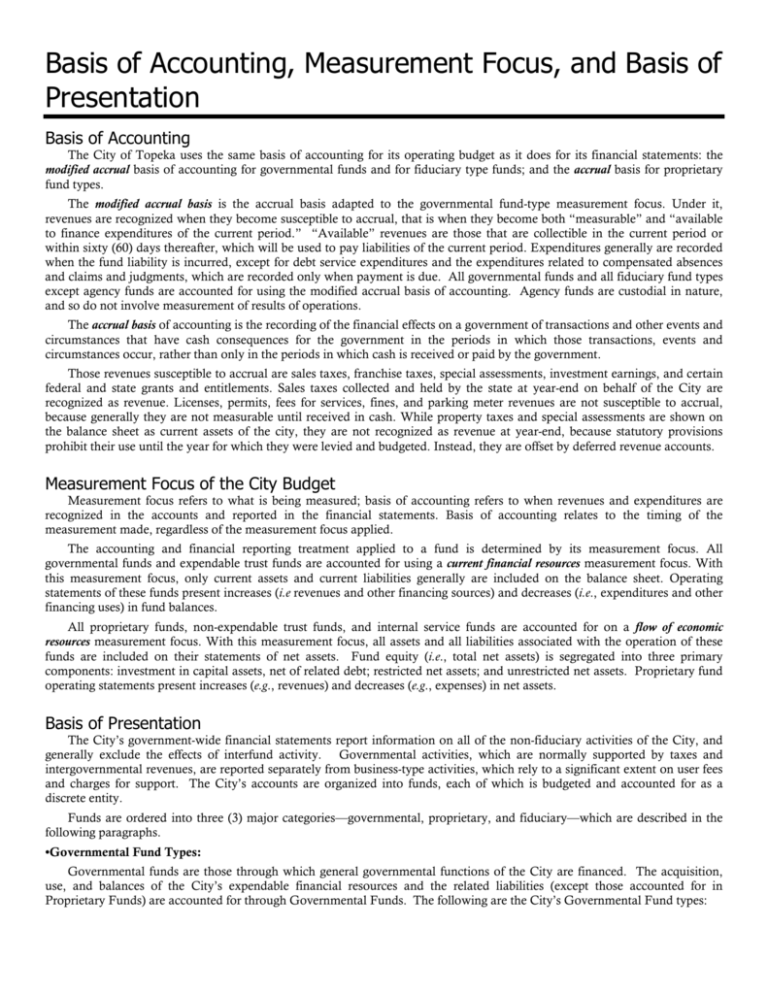
Basis of Accounting, Measurement Focus, and Basis of Presentation Basis of Accounting The City of Topeka uses the same basis of accounting for its operating budget as it does for its financial statements: the modified accrual basis of accounting for governmental funds and for fiduciary type funds; and the accrual basis for proprietary fund types. The modified accrual basis is the accrual basis adapted to the governmental fund-type measurement focus. Under it, revenues are recognized when they become susceptible to accrual, that is when they become both “measurable” and “available to finance expenditures of the current period.” “Available” revenues are those that are collectible in the current period or within sixty (60) days thereafter, which will be used to pay liabilities of the current period. Expenditures generally are recorded when the fund liability is incurred, except for debt service expenditures and the expenditures related to compensated absences and claims and judgments, which are recorded only when payment is due. All governmental funds and all fiduciary fund types except agency funds are accounted for using the modified accrual basis of accounting. Agency funds are custodial in nature, and so do not involve measurement of results of operations. The accrual basis of accounting is the recording of the financial effects on a government of transactions and other events and circumstances that have cash consequences for the government in the periods in which those transactions, events and circumstances occur, rather than only in the periods in which cash is received or paid by the government. Those revenues susceptible to accrual are sales taxes, franchise taxes, special assessments, investment earnings, and certain federal and state grants and entitlements. Sales taxes collected and held by the state at year-end on behalf of the City are recognized as revenue. Licenses, permits, fees for services, fines, and parking meter revenues are not susceptible to accrual, because generally they are not measurable until received in cash. While property taxes and special assessments are shown on the balance sheet as current assets of the city, they are not recognized as revenue at year-end, because statutory provisions prohibit their use until the year for which they were levied and budgeted. Instead, they are offset by deferred revenue accounts. Measurement Focus of the City Budget Measurement focus refers to what is being measured; basis of accounting refers to when revenues and expenditures are recognized in the accounts and reported in the financial statements. Basis of accounting relates to the timing of the measurement made, regardless of the measurement focus applied. The accounting and financial reporting treatment applied to a fund is determined by its measurement focus. All governmental funds and expendable trust funds are accounted for using a current financial resources measurement focus. With this measurement focus, only current assets and current liabilities generally are included on the balance sheet. Operating statements of these funds present increases (i.e revenues and other financing sources) and decreases (i.e., expenditures and other financing uses) in fund balances. All proprietary funds, non-expendable trust funds, and internal service funds are accounted for on a flow of economic resources measurement focus. With this measurement focus, all assets and all liabilities associated with the operation of these funds are included on their statements of net assets. Fund equity (i.e., total net assets) is segregated into three primary components: investment in capital assets, net of related debt; restricted net assets; and unrestricted net assets. Proprietary fund operating statements present increases (e.g., revenues) and decreases (e.g., expenses) in net assets. Basis of Presentation The City’s government-wide financial statements report information on all of the non-fiduciary activities of the City, and generally exclude the effects of interfund activity. Governmental activities, which are normally supported by taxes and intergovernmental revenues, are reported separately from business-type activities, which rely to a significant extent on user fees and charges for support. The City’s accounts are organized into funds, each of which is budgeted and accounted for as a discrete entity. Funds are ordered into three (3) major categories—governmental, proprietary, and fiduciary—which are described in the following paragraphs. •Governmental Fund Types: Governmental funds are those through which general governmental functions of the City are financed. The acquisition, use, and balances of the City’s expendable financial resources and the related liabilities (except those accounted for in Proprietary Funds) are accounted for through Governmental Funds. The following are the City’s Governmental Fund types: Basis of Accounting, Measurement Focus, and Basis of Presentation The General Fund is the main operating fund of the City. This fund is used to account for all financial resources not accounted for in other funds. All general tax revenues and other receipts that are not restricted by law or other contractual agreement to some other fund are accounted for in this fund. General operating expenditures, fixed charges and capital improvement costs that are not paid through other funds are paid from the General Fund. The Special Revenue Funds are used to account for the proceeds of specific revenue resources that are legally restricted to expenditures for specified purposes. The Debt Service Fund is used to account for the accumulation of financial resources for the payment of principal, interest and related costs on general long-term debt paid primarily from taxes levied by the City. The fund balance of the Debt Service Fund is reserved to signify the amounts that are restricted exclusively for debt service expenditures. The Capital Projects Funds are used to account for the acquisition or construction of capital facilities (other than those financed by proprietary funds) being financed from general obligation bond proceeds, grants, or transfers from other funds. •Proprietary Fund Types: Proprietary funds are accounted for on a flow of economic resources measurement focus. Proprietary funds distinguish between operating and non-operating revenues and expenses, and the principal revenues are derived from charges to customers for sales and services. The City uses the following types of proprietary funds: The Enterprise Funds are used for activities which are financed and operated in a manner similar to private business enterprise where the intent of the governing body is that the costs (expenses, including depreciation) of providing goods or services to the general public on a continuing basis be financed or recovered primarily through user charges, or where the governing body has decided that periodic determination of revenues earned, expenses incurred, or net income is appropriate for capital maintenance, public policy, management control, accountability, or other purposes. The Internal Service Funds are used to account for the financing of goods or services provided by one City department to other departments of the City on a cost-reimbursement basis. •Fiduciary Fund types: Fiduciary Fund types are used to account for assets held by the City in a trustee capacity or as an agent for individuals, private organizations, other governments and/or other funds. Expendable Trust Funds are accounted for in essentially the same manner as Governmental Funds, using a modified accrual basis of accounting. Agency funds are custodial in nature and do not involve measurement of results of operations.





